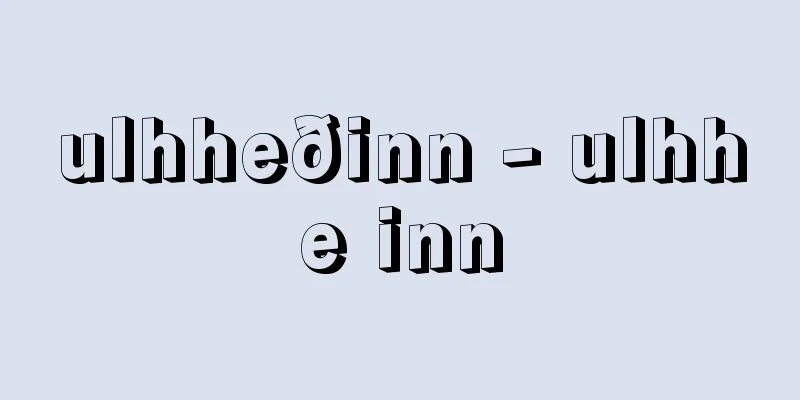Closed Gate - Heimon

|
〘noun〙① To close the gate. To close the gate and not go out or meet people. ※Yashirohon Heike (early 13th century) Volume 3 "He rushed down to Fukuhara and locked himself in (heimon) ." ※Gikeiki (mid-Muromachi period) Volume 6 "He was saddened when people came to visit him and locked himself in (heimon)." [Book of the Later Han - Biography of Feng Yan] ② = heiro (confined) ② ※Kōyasan documents - August 9th year of Kōan (1286), Kongōbu-ji temple monk contract "If you are unable to litigate, you can leave the mountain and stay in seclusion ." ③ To close the gate and stay in seclusion to show one's intention of seclusion or isolation . Also, to make someone do so. ※Koyoki - June 3, 985, 1st year of the Kan'wa era (985) "Now, the day of mourning, confinement to the gates and house arrest" ※Gukansho (1220) 4 "He was confined to the gates and house arrest without being allowed to visit the inside" ④ One of the confinement punishments imposed on samurai, monks, and shrine priests during the Edo period. It was more severe than Ensyo and Hissoku . For 50 to 100 days, the gates and windows were closed from the outside, and no one was allowed to enter or leave. The sick were allowed to call for a doctor in the middle of the night, the dead were sent to the temple in the middle of the night, and in the event of a fire, they were only allowed to leave. ※Haiku poem Soin Shichihyakuin (1677) "The way of action is decided by three people, death penalty, exile, or confinement to the gates (Haemon) " [Kinryo-ko - Separate volume, Toin Hisan, Toru, 103 (1841)] Source: The Selected Edition of the Japanese Language Dictionary About the Selected Edition of the Japanese Language Dictionary Information |
|
〘名〙① 門をしめること。門をとざして、外に出たり人に会ったりしないこと。※屋代本平家(13C前)三「福原に馳下て、閉門(ヘイモン)してこそ御坐けれ」※義経記(室町中か)六「人の訪ひ来るも物憂しとてへいもんしておはしけるが」 〔後漢書‐馮衍伝〕② =へいろう(閉籠)②※高野山文書‐弘安九年(1286)八月日・金剛峯寺衆徒契状「訴訟若不レ達者、可レ及二離山閇門事一」③ 謹慎・忌籠(いみごもり)の意を表わすために門をとざしてこもっていること。また、そうさせること。※小右記‐寛和元年(985)六月三日「今明物忌、閉門蟄居」※愚管抄(1220)四「内覧とどめて閉門せられにけり」④ 江戸時代、武士・僧侶・社人らに科せられた監禁刑の一つ。遠慮・逼塞(ひっそく)などより重い。五〇日から一〇〇日の間、外から門をとざし窓をとじ、一切の出入を許さなかった。病人は夜中医者をよび、死人は夜中菩提所へ送り、火事で焼失した時は立退くことだけが許された。※俳諧・宗因七百韵(1677)「行は三人の道ことにして 死罪流罪に又は閉門(ヘイモン)」 〔禁令考‐別巻・棠蔭秘鑑・亨・一〇三(1841)〕
出典 精選版 日本国語大辞典精選版 日本国語大辞典について 情報 |
<<: Plain - Heiya (English spelling)
>>: Plane wave - heimenha (English spelling) plane wave
Recommend
Radix auricularia japonica (English spelling)
A freshwater snail shell of the Lymnaea family (il...
Circular (Circular) - Kaijo
Generally speaking, it is a document that conveys ...
Yamanaka-shi
A medieval samurai family originating from Yamanak...
Shibaijaya - Shibaijaya
A kabuki theater institution that existed from th...
Mair, V. (English spelling) MairV
…The Dunhuang Transformative Texts (Beijing, 1957...
Red spotted scarab beetle - Red spotted scarab beetle
…The larvae bend strongly ventrally and the abdom...
Martin, Steve
Born August 14, 1945 in Waco, Texas. American come...
John Smeaton
British engineer. Born in Austhorpe near Leeds, h...
Presbyterian Church - Chorouhakyokai
In English it is called the Presbyterian Church. I...
Indoor playground - Okunai Sports Ground
…A gymnasium is originally a facility for indoor ...
Colebrooke, Henry Thomas
Born: June 15, 1765, London [Died] March 10, 1837....
Stock option
Options generally refer to the right to acquire (c...
One-sided mouth
〘Noun〙 In the Edo period, when the plaintiff and d...
melancholia
...However, after the age of 20, the blood vessel...
Fruit fertilizer - Migoe
This is a top-dressing fertilizer applied after t...









